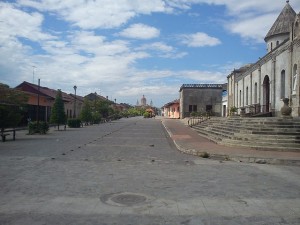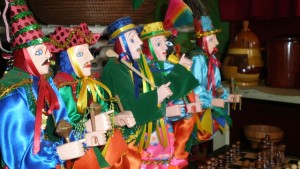 Nicaragua: Revolutionary Poets
Nicaragua: Revolutionary Poets
Nicaragua is a Central American Country located between Honduras and Costa Rica. It is known for its breath-taking, gorgeous scenery and dangerous terrain. Along with the country’s natural beauty it is also the origin place of the most beautiful, profound, enlightening, and moving poetry.
Although Nicaragua is known for its scenic beauty, it is also recognized as a “A nation of Poets.” Rubin Dario and Ernesto Cardenal are national Nicaraguan poets that have made important legacies contributing to world literature. Nicaraguan poets have taken an active part in the social and political life of the country detailing the lives of politicians, revolutionaries, and cultural leaders as well as the society at large.
The city of Granada is a beautiful Nicaraguan city that has been the host of the International Poetry Festival since 2005. Poets travel from far and wide to participate and contribute to this event, and rightfully so. It has quickly become known as having some of the most talented writers and performers in the poetry literature world.
Brief History
 Nicaraguan people that lived in rural areas were kept illiterate for a long period of time by the Somoza family dynasty as a means of implementing segregationist policies until the 1979 revolution. The Somoza’s dictatorship was overthrown in 1980 and the Nicaraguan Literacy Campaign was organized by the new government, which was directed by the brother of Ernesto Cardenal (the Rev. Fernardo Cardenal). The influence of poetry played a remarkable and transformative part in educating the youth of Nicaragua despite the scarcity of resources in schools and centers for adult education.
Nicaraguan people that lived in rural areas were kept illiterate for a long period of time by the Somoza family dynasty as a means of implementing segregationist policies until the 1979 revolution. The Somoza’s dictatorship was overthrown in 1980 and the Nicaraguan Literacy Campaign was organized by the new government, which was directed by the brother of Ernesto Cardenal (the Rev. Fernardo Cardenal). The influence of poetry played a remarkable and transformative part in educating the youth of Nicaragua despite the scarcity of resources in schools and centers for adult education.
About 60,000 high school and college aged young people, and nearly 30,000 adults, were taught and sent to teach literacy in rural areas as part of a national campaign. During that time national reconstruction was greatly emphasized through poetry workshops. Poetry workshops offered Nicaraguans the unparalleled means of expression they were denied during a dictatorship that lasted for 40 years. Today, the Nicaraguan emphasis on poetry continues. Children of Nicaragua are taught to memorize and recite powerfully deep and significant national poems to learn about their country and culturally rich history.
RUBEN DARIO was a pen name for one of Nicaragua’s national poet. He was born Félix Rubén García Sarmiento in 1867. Widely considered a exceptional poetic influence in Central American, Dario is credited as having sparked the Spanish-American literary movement called ‘modernismo.’ Along with being a tremendous poet, he was also a diplomat and a journalist. Though he traveled throughout Central America for his work, he eventually returned to his home to Nicaragua and passed away in 1916.
ERNESTO CARDENAL was a prominent political, cultural, libertarian, and theologian figure for the Sandinista National Liberation Front during the time of rebellion and conflict against the dictatorship of Anastasio Somoza. After the dynasty’s overthrow, under the first Sandinista government, Ernesto was highly regarded and served as Minister of Culture. His political career in Nicaragua is illustrated in the works of his poetry. He has obtained several awards for his poetry and even received a nomination for the Nobel Prize in Literature in 2005. Today Cardenal travels all over the world teaching, sharing, and continuing to learn from others.
GIOCONDA BELLI, likewise, participated in the Sandinista rebellion and served in the first Sardinista government. As a poet, her works reveal the struggle for the Nicaraguan people’s self-determination. Her poetry works center on the time when she served in the movement of the revolution and the turbulence caused to her and in the lives of Nicaraguans.
In the early Twentieth Century, the dictator Jose Santos Zelaya was the controlling power in Nicaragua. The poet, SALOMON DE la SELVA, was a very active revolutionist who rebelled against this dictatorship. Partly influenced by his family’s oppression in Nicaragua, De la Selva moved to the U.S. and plunged himself in the literary setting of New York. Today he is recognized as one of Nicaragua’s most influential poets.
But let us not forget another amazing female poet from Nicaragua. Born in 1924 as Clara Isabel Alegria Vides, CLARIBEL ALGERIA is most known for using a language that is typically considered to be counter-literary. Her poetry is heavily influenced by politics and activism. She was awarded the Neustadt International Prize for Literature in 2006. Her work as a novelist, journalist, essay writer, and poet have allowed her to use her voice to reach the hearts and minds of many. She has published many full books of poetry and she continues to influence others by speaking and teaching at events and in classrooms all over the world.
These well known poets are just the tip of the iceberg as far as what Nicaragua has to offer regarding poetry and literature. It is truly no wonder that Nicaragua was chosen to be the home of the International Poetry Festival. It seems that modern writers have a great deal to learn about Nicaraguan poetry and its people.




